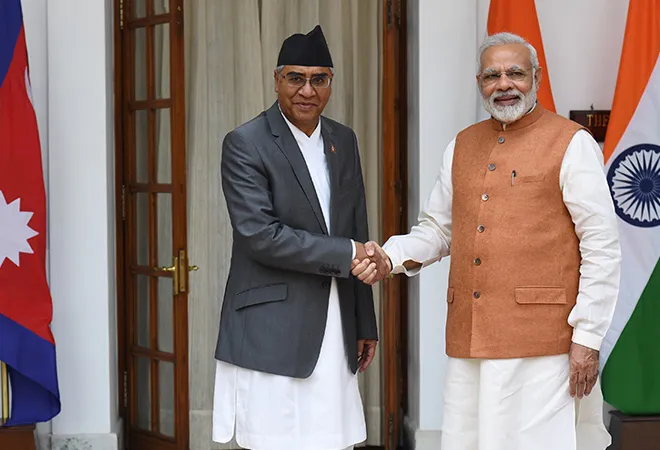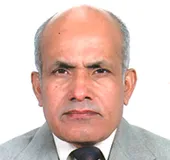
Nepal has been facing an unprecedented economic crisis because of the liquidity crunch, depletion of foreign exchange reserve, and above all, the border with China is virtually closed, which has been hampering the movement of people and goods between the two countries affecting the inflow of tourists and investment from China to Nepal. In his bid to defuse the crisis at home, the Nepalese Prime Minister Sher Bahadur Deuba made an official visit to India on 1–3 April, where he discussed a wide range of issues with his Indian counterpart Narendra Modi such as boundary issues, hydropower development, power trade, financial connectivity, and cross-border transportation. Agreements signed between the two countries in some of these areas are crucial to the future of Nepal.
Both Nepal and India claim the Kalapani, Lipulekh, and Limpuaduhura areas lying in Nepal’s northwestern direction as part of their respective territories. Also, the two leaders agreed that the open border system between the countries should not be allowed to be misused by unwanted elements.
In Delhi, both Prime Minister Deuba and Prime Minister Modi agreed to resolve the contentious boundary issue through a
bilateral mechanism via dialogue in the spirit of the close and friendly relations shared by the two countries. The relations between Nepal and India were strained on the boundary issues in May 2020 at a time when K.P. Sharma Oli was the Prime Minister of Nepal. Both Nepal and India claim the Kalapani, Lipulekh, and Limpuaduhura areas lying in Nepal’s northwestern direction as part of their respective territories. Also, the two leaders agreed that the
open border system between the countries should not be allowed to be misused by unwanted elements.
Nepal and India also reviewed the progress in the implementation of Indian projects in Nepal. They agreed to expedite the progress in the implementation of the
Pancheshwar Multipurpose Project. It was as far back as 1996 when Prime Minister Sher Bahadur Deuba of Nepal and Prime Minister Narasimha Rao of India had signed the Mahakali Treaty, which was also ratified by the Nepalese Parliament with over two-thirds majority. But even after more than two-and-half decades, the project remained in limbo and its Detailed Project Report (DPR) could not be finalised. If the Pancheshwar Multipurpose Project under the Mahakali Treaty were implemented, that could have generated 6,000 MW of hydropower and have proved a game-changer for Nepal.
To ensure the time-bound completion of India-assisted projects in Nepal, Prime Minister Deuba assured India of his government’s full support in resolving all the outstanding issues in the
implementation of India-assisted projects like the National Police Academy at Kavrepalanchowek, the Integrated Check Posts at Nepalgunj and Bhairahawa, along with the projects under the Ramayana circuit.
Prime Minister Deuba and Prime Minister Modi also inaugurated a 90-km long
132kvdc Solu Corridor Transmission line and sub-station in Nepal under the government of India’s Line of Credit at the cost of INR. 200 crores. India also helped Nepal to become a member of the
International Solar Alliance, which is a step towards promoting the production of sustainable, affordable, and clean energy.
Prime Minister Sher Bahadur Deuba and Prime Minister Narendra Modi inaugurated cross-border passenger train services between Jaynager in Bihar (India) and Kurtha/Janakpur (Nepal), which happen to be a part of the 68.7 kilometres Jaynagar–Bijalpura–Bardibas rail link constructed with the grant assistance of the government of India at the cost of NPR. 8.77 billion.
Most importantly, the two countries finalised a vision statement to strengthen cooperation on the
joint development of power generation projects in Nepal. Accordingly, the focus was given to cross-border development of infrastructure to facilitate bi-directional power trade between the two countries. Towards this end, Prime Minister Sher Bahadur Deuba and Prime Minister Narendra Modi inaugurated cross-border passenger train services between Jaynager in Bihar (India) and Kurtha/Janakpur (Nepal), which happen to be a part of the 68.7 kilometres Jaynagar–Bijalpura–Bardibas rail link constructed with the grant assistance of the government of India at the cost of NPR. 8.77 billion. Besides, they also launched the RuPay payment card system in Nepal, which is expected to add a new chapter to
financial connectivity between the two countries and promote bilateral
tourist flows, apart from strengthening
people-to-people linkages between the two countries.
Soon after the announcement of the Joint Vision Statement on Power Sector Cooperation,
India allowed the Nepal Electricity authority to sell an additional 325 MW of electricity to India over and above the 39 MW of power that is already exported. Now, Nepal will start exporting power to India from the upcoming monsoon season as the country would have a
power surplus to the extent of 400 to 500 MW by that time. Welcoming India’s positive attitude towards Nepal, Kul Man Ghising, the Managing Director of Nepal Electricity Authority stated, “This is an important milestone for Nepal’s power sector development”.
In its major policy shift, India exhibited that it wants Nepal to move beyond India in the power trade and develop power sub-regionally within the framework of the BBIN (Bangladesh, Bhutan, India, and Nepal) agreement. Earlier, India wanted Nepal to have a power deal only with itself, but now it is in favour of Nepal going for power trade even with Bangladesh. Thus, the possibility of India giving access to Nepal and Bangladesh for power trade through an electricity transmission line from its territory has increased. To take advantage of this generous attitude of India, Bangladesh is likely to invest in hydropower projects in Nepal.
The Nepalese government cancelled the much controversial 1,200 MW Budhi Gandaki Hydropower Project awarded to the Chinese company for its failure to initiate work in time.
India has made it clear to Nepal that it would not import power from such hydropower projects where there is direct or indirect involvement of the Chinese companies. Because of this change in India’s policy in power deal with Nepal, the attraction for Chinese investment in the hydropower sector in Nepal has been reduced. The impact of this policy change was soon realised after Prime Minister Deuba returned from Delhi to Kathmandu. The Nepalese government cancelled the much controversial 1,200 MW
Budhi Gandaki Hydropower Project awarded to the Chinese company for its failure to initiate work in time. The government decided to begin the work on the project through domestic investment, which could now pave the way for more power sales from this project to India.
Prime Minister Deuba’s visit to India remained fruitfulso far as it paved the way for settling the boundary-related issue through the dialogue and increasing the production of hydropower in Nepal, mainly with the Indian investment. Thrust on cross-border connectivity through infrastructure development and financial connectivity through the RuPay payment card system was the key for Nepal to benefit from India’s economic development. Strategically, the visit remained important for India so far as it aims at discouraging Chinese investment in Nepal and promoting sub-regional cooperation through power trade amongst BBIN member countries. Certain differences between Nepal and China mainly on account of the closing of the border and the positive attitude shown by India to boost the growth of the Nepalese economy developed a high level of trust between the two countries, which might ensure larger economic cooperation for the benefit of the people of the two countries in future.
The views expressed above belong to the author(s). ORF research and analyses now available on Telegram! Click here to access our curated content — blogs, longforms and interviews.



 Nepal has been facing an unprecedented economic crisis because of the liquidity crunch, depletion of foreign exchange reserve, and above all, the border with China is virtually closed, which has been hampering the movement of people and goods between the two countries affecting the inflow of tourists and investment from China to Nepal. In his bid to defuse the crisis at home, the Nepalese Prime Minister Sher Bahadur Deuba made an official visit to India on 1–3 April, where he discussed a wide range of issues with his Indian counterpart Narendra Modi such as boundary issues, hydropower development, power trade, financial connectivity, and cross-border transportation. Agreements signed between the two countries in some of these areas are crucial to the future of Nepal.
Nepal has been facing an unprecedented economic crisis because of the liquidity crunch, depletion of foreign exchange reserve, and above all, the border with China is virtually closed, which has been hampering the movement of people and goods between the two countries affecting the inflow of tourists and investment from China to Nepal. In his bid to defuse the crisis at home, the Nepalese Prime Minister Sher Bahadur Deuba made an official visit to India on 1–3 April, where he discussed a wide range of issues with his Indian counterpart Narendra Modi such as boundary issues, hydropower development, power trade, financial connectivity, and cross-border transportation. Agreements signed between the two countries in some of these areas are crucial to the future of Nepal.
 PREV
PREV


